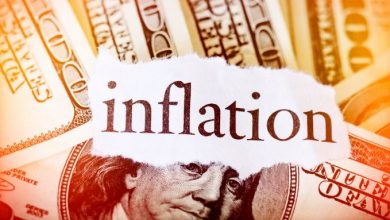Stay Ahead: Tracking Inflation and Preparation Strategies
To effectively navigate the challenges posed by inflation and safeguard personal finances, it’s crucial to remain vigilant, identify economic distortions caused by rising prices, and make informed financial decisions. In this section, we will delve into the significance of inflation tracking and preparation, recognizing the economic distortions that inflation can create, and outlining strategies for making sound financial choices to mitigate the impact of inflation.

The Significance of Monitoring Inflation Rates
Staying informed about inflation rates is the cornerstone of effective financial planning. Regularly tracking inflation allows individuals to assess its impact on their purchasing power, savings, and investments. Key reasons why monitoring inflation rates is significant include:
Budgeting and Financial Planning: Understanding the rate of inflation helps individuals create realistic budgets and long-term financial plans. It enables them to anticipate the rising costs of goods and services and make necessary adjustments to maintain their desired standard of living.
It also sheds light on the importance of prudent investment choices. Inflation can erode the real value of cash sitting idle in a savings account, making it crucial to consider investment opportunities that can outpace or at least keep pace with inflation. By wisely allocating funds to assets like stocks, real estate, or bonds that have historically shown the potential to grow at rates exceeding inflation, individuals can protect and grow their wealth over time. This dual understanding of inflation, as a budgetary consideration and an investment motivator, serves as a powerful tool in the financial arsenal of individuals striving to achieve their financial goals and secure their financial future.
Investment Decisions: Inflation rates directly influence the performance of various asset classes. Investors need to be aware of inflation trends to make informed decisions about asset allocation and investment strategies.
Investment decisions are profoundly influenced by the ebb and flow of inflation rates. The impact of inflation is particularly pronounced when it comes to different asset classes, including inflation tracking and preparation. For example, stocks, often seen as a hedge against inflation, can perform well during periods of moderate inflation, as corporate earnings and asset prices tend to rise. Conversely, bonds can become less appealing as inflation climbs, causing interest rates to rise and reducing the real return on fixed-rate bonds. This awareness of the interplay between inflation and asset classes, especially within the context of inflation tracking and preparation, is pivotal for investors who aim to build a well-rounded investment portfolio that can weather the fluctuations in the economic environment.
Savings Goals: For those saving for specific financial goals, such as retirement or education, tracking inflation rates is crucial. Failing to account for inflation can lead to falling short of these goals as the real value of savings erodes over time.
Savings goals, whether it’s building a comfortable retirement nest egg or funding a child’s education, demand a keen understanding of inflation’s role. Inflation is like a silent but persistent thief, continually chipping away at the real value of your savings. If you fail to account for inflation, you risk falling short of your financial aspirations. Consider retirement savings, for instance. Without factoring in inflation, you might miscalculate the amount you need to maintain your desired standard of living in your post-work years. This oversight can result in a substantial shortfall in your retirement fund, leaving you financially vulnerable during a time when financial security matters most. For more in-depth insights, don’t miss our article on “4 Strategies for Secure Retirement Planning in the Face of Inflation.” Learn how to safeguard your retirement in challenging economic conditions
The same holds true for education savings, where tuition costs tend to outpace inflation. Ignoring this reality can lead to a funding gap when it’s time to send your child off to college or university. Therefore, keeping a watchful eye on inflation is not just a prudent financial practice; it’s an essential tool for ensuring that your savings goals remain on track and your financial future remains secure.
Identifying Economic Distortions Caused by Inflation
Inflation can create economic distortions that impact both individuals and businesses. An article from Capital Group recognizes that high inflation is the ultimate pandemic distortion. Recognizing these distortions is essential for making financial decisions.

Inflation is a formidable force that has several implications deserving of our attention. First and foremost, rapid inflation can sow the seeds of price distortions, causing unpredictable and erratic movements in the costs of goods and services. This unpredictability can pose significant challenges for consumers trying to plan their expenses and businesses attempting to set stable prices. Such an environment of uncertainty can shake the foundations of economic stability, making it difficult for both individuals and enterprises to navigate the financial landscape.
Furthermore, inflation can play a role in inflating asset bubbles within financial markets. These bubbles occur when the prices of certain assets, like stocks or real estate, become disconnected from their intrinsic or fundamental value. When these bubbles eventually burst, it can lead to substantial financial losses, impacting not only investors but also the broader economic stability. The aftermath of such bursts can have far-reaching consequences, underscoring the importance of monitoring inflation as a contributing factor to these events.
In addition to these economic effects, inflation can also have a social impact by exacerbating income inequality. Not all income groups are affected equally by inflation. Higher-income individuals and businesses often possess more resources and flexibility to cope with rising costs. Conversely, lower-income households may find it challenging to keep pace with inflation, potentially deepening income disparities within society. Recognizing these disparities is crucial for policymakers and economists in crafting measures to ensure a more equitable distribution of the economic burden caused by inflation. In essence, understanding the multifaceted implications of inflation is pivotal for maintaining economic stability and social equity.
Crafting a Financial Strategy to Mitigate Inflation’s Impact
Mitigating the impact of inflation on personal finances requires making informed financial decisions. Here are some strategies individuals can employ to prepare for and mitigate the effects of inflation:
Invest Wisely: Investing wisely in the context of inflation is akin to building a sturdy financial fortress that can withstand the test of time. To ensure your investments keep pace with or outperform inflation, it’s essential to consider asset classes that have historically demonstrated resilience. Stocks, for example, have often been regarded as one of the go-to options for investors seeking to hedge against inflation. Companies with the ability to raise their prices when faced with increasing costs can thrive in an inflationary environment, potentially resulting in robust returns for shareholders.
Real estate investments also tend to perform well during inflationary periods, as property values and rental income typically rise with price increases. Additionally, inflation-protected bonds, like Treasury Inflation-Protected Securities (TIPS), offer a safeguard by adjusting their returns to match inflation, making them a valuable addition to your investment portfolio.
However, the key to a resilient investment strategy lies in diversification. Spreading your investments across a variety of asset classes, including stocks, real estate, bonds, and even commodities, can provide a safety net against inflation risk. Each of these asset classes responds differently to inflationary pressures, with some being more resilient than others. Diversification ensures that you’re not overly exposed to any single asset class’s performance, helping to mitigate the impact of inflation on your overall portfolio. By maintaining a balanced mix of investments and periodically reviewing and rebalancing your portfolio, you can fortify your financial future and better position yourself to thrive in the face of inflationary challenges.
Regularly Review and Adjust: Regularly reviewing and adjusting your financial strategies is akin to fine-tuning the engine of your financial well-being to adapt to the changing economic landscape. Start by periodically revisiting your budget, the foundation of your financial stability. Inflation isn’t a static force; it fluctuates over time, and its impact on various expenses can vary. By revisiting your budget regularly, you can identify areas where inflation is taking a toll and adjust your spending accordingly. This can involve reallocating funds to accommodate rising costs, finding ways to economize, or exploring opportunities to increase your income. Staying vigilant with your budget ensures that you’re well-prepared to navigate the ongoing challenges posed by inflation.

Similarly, it’s essential to periodically assess your savings and investment strategies to keep them in alignment with your financial goals and the prevailing economic conditions. Inflation rates can fluctuate over time, impacting the real return on your investments. A prudent approach is to work with a financial advisor or use online tools to estimate the impact of inflation on your savings and investments. If you discover that your financial goals are at risk due to inflation eroding your purchasing power, consider adjusting your investment allocation to include assets that historically perform well in inflationary environments, such as stocks or inflation-protected bonds. Regularly reviewing and adjusting your financial strategies ensures that you remain nimble and proactive in safeguarding your financial future in the face of changing inflation rates and economic conditions.
Emergency Fund: Building and maintaining an emergency fund is akin to having a financial safety net that can shield you from the unexpected shocks that life can throw your way, especially during periods of rising prices. This fund should consist of readily accessible cash or cash-equivalents, such as a savings account or money market account. When unexpected expenses arise, like medical bills, car repairs, or home maintenance, having this financial cushion ensures that you don’t need to dip into your regular budget or rely on credit cards, which can accumulate high-interest debt.
In the face of persistent inflation and economic uncertainty, a recent Bankrate survey reveals that just 48 percent of American adults have sufficient emergency savings to cover a minimum of three months’ worth of expenses. It means that a significant portion of the population remains vulnerable to financial shocks and unexpected challenges. Building a robust emergency fund should be a priority for those who may find themselves unprepared for the uncertainties that lie ahead, helping to provide a vital safety net during challenging times.
Moreover, an emergency fund can be a powerful ally in managing the impact of inflation on your daily life. While inflation can cause prices to rise across the board, certain expenses, like healthcare or home repairs, may increase unexpectedly. Having a well-funded emergency fund ensures that you’re prepared to tackle these unplanned costs without disrupting your long-term financial plans. It offers peace of mind, knowing that you have a financial buffer in place to weather the storms of life and maintain your desired standard of living, even in an inflationary environment.
Debt Management: Managing debt wisely is a pivotal aspect of mitigating the financial challenges that inflation can bring. High-interest debt, such as credit card balances or payday loans, can exacerbate the impact of rising prices by adding substantial interest expenses to your financial burden. To navigate these challenges effectively, prioritize paying down high-interest loans as a strategic move. Channeling your resources towards debt reduction not only lowers your interest payments but also frees up funds for other essential expenses and investments.
Inflation, while posing economic challenges, can also provide an opportunity for individuals to reassess their financial priorities and take proactive steps toward securing their financial future. By effectively managing debt, you not only minimize the negative effects of inflation on your finances but also position yourself to make more informed decisions about savings and investment strategies. It’s like removing an anchor that was holding you back, allowing you to sail towards your financial goals with greater ease and confidence.
Seek Professional Advice: Seeking professional advice from a financial advisor can be a wise step to navigate the complexities of managing your finances effectively in an inflationary environment. Financial advisors possess the expertise and experience to analyze your unique financial situation, assess your goals, and develop a tailored plan to address inflation-related challenges. They can help you understand the intricacies of inflation, its impact on your investments, and the strategies best suited to your specific needs. This guidance can be invaluable in making informed decisions that align with your financial objectives and provide a sense of security in uncertain economic times.

Additionally, a financial advisor can assist in monitoring your investments, ensuring they remain aligned with your goals and risk tolerance as inflation rates fluctuate. They can help you diversify your portfolio with assets that historically performed well in inflationary periods, such as stocks or inflation-protected bonds. Moreover, a trusted advisor can provide ongoing support, helping you stay on track with your financial plans and make adjustments as necessary to counteract the effects of inflation. In essence, consulting with a financial advisor adds a layer of professional insight to your financial strategy, enhancing your ability to navigate the challenges of an inflationary environment with confidence and precision.
Conclusion on Inflation Tracking and Preparation
Inflation, a persistent economic force, can significantly impact personal finances, presenting both challenges and opportunities. To effectively navigate the ever-changing landscape of rising prices, it is essential to remain vigilant, recognize economic distortions, and make financially sound choices based on information, and prioritize inflation tracking and preparation.
Keeping a close eye on inflation rates is paramount for sound financial planning. It aids in creating realistic budgets, adjusting long-term financial plans, and understanding how inflation affects purchasing power, savings, and investments. To avoid falling short of savings goals, such as retirement or education, due to inflation’s erosion, it is imperative to factor inflation into your calculations.
Inflation can lead to economic distortions, affecting both individuals and businesses. It can create price unpredictability, inflate asset bubbles, and exacerbate income inequality. Recognizing these implications is crucial for policymakers and economists in crafting measures to ensure a more equitable distribution of the economic burden caused by inflation, which is essential for maintaining economic stability and social equity.
Mitigating the impact of inflation on personal finances necessitates making informed financial decisions. Investing wisely, regularly reviewing and adjusting financial strategies, maintaining an emergency fund, managing debt, and seeking professional advice are key strategies to safeguard your financial future and thrive in the face of changing inflation rates and economic conditions.
In summary, proactively tracking and preparing for inflation is a vital aspect of securing your financial well-being. By being vigilant, recognizing economic distortions, and crafting a well-informed financial strategy, you can not only protect your wealth but also position yourself for financial success in the ever-changing economic landscape. Stay informed, stay flexible, and make inflation a tool that works for you, not against you.
Resources:





